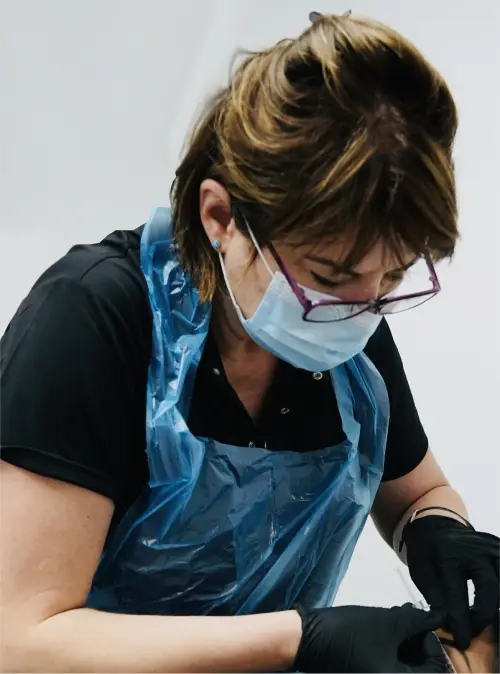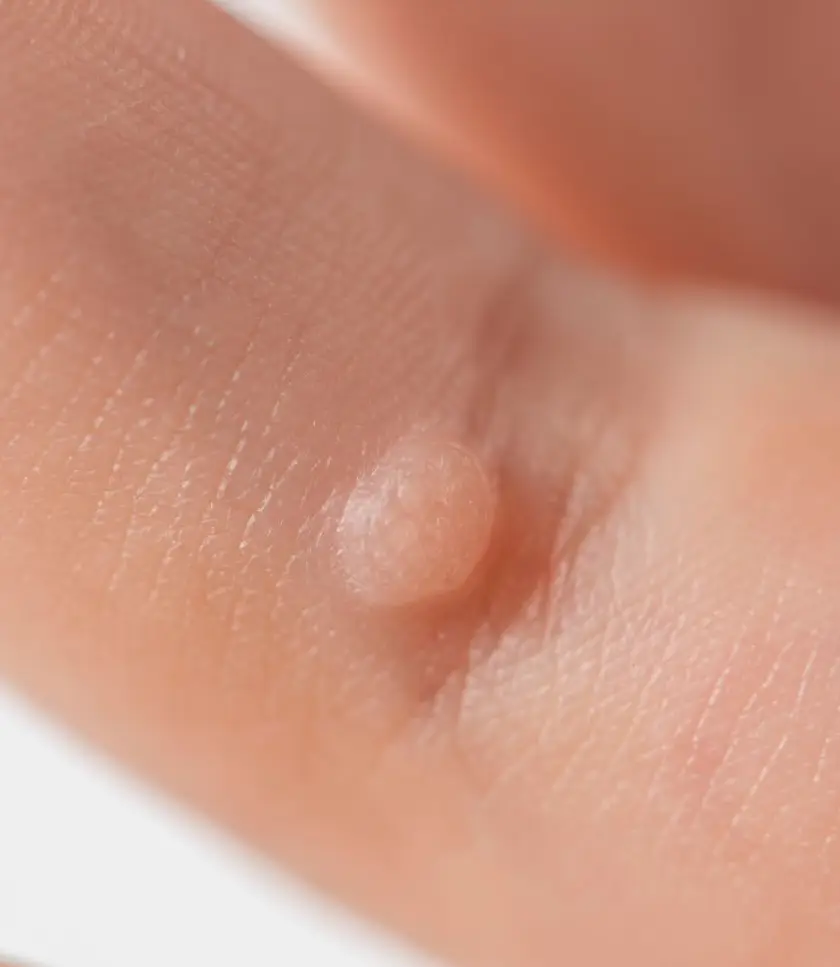
Skin Health & Beauty Clinic
Wart & Verruca Removal In Bournemouth
Benign Moles Removal By Our Professional Medical Team


What Are Warts And Verrucae?
Warts and verrucae are both types of skin growths caused by the human papillomavirus (HPV). Warts typically appear as small, rough, and raised bumps on the skin, varying in color and texture. They can develop on any part of the body but are most common on the hands, fingers, and feet. Verrucae, on the other hand, specifically refer to warts that appear on the soles of the feet. They often have a rough, cauliflower-like appearance and may cause discomfort or pain when walking. Both warts and verrucae are contagious and can spread through direct contact or by sharing personal items with an infected individual. Treatment options include topical medications, cryotherapy (freezing), laser therapy, or surgical removal, depending on the size, location, and severity of the growths.
We also remove benign:
Why should I remove warts and verrucae?
Warts, which can affect individuals of all ages and genders, are often located in noticeable areas, potentially causing self-consciousness or discomfort. Verrucae, specifically referring to warts on the sole of the foot, present similar concerns. However, through swift and efficient treatment by experience and qualify aesthetic clinicians at Skin Health & Beauty Clinic, clarity and confidence can be restored, leaving behind clear, healthy skin.
The clinical benefits of removing warts or verrucae extend beyond mere aesthetics to encompass various aspects of skin health and overall well-being. Firstly, by eliminating these growths, individuals can alleviate discomfort or pain associated with verrucae, particularly those located on weight-bearing areas like the feet. Moreover, removing warts or verrucae reduces the risk of spreading the human papillomavirus (HPV) to other parts of the body or to other individuals, thereby aiding in the prevention of further infections. Additionally, the removal of warts or verrucae can mitigate the potential for secondary complications such as skin irritation, inflammation, or infection. Ultimately, achieving clear, healthy skin through professional removal not only enhances physical comfort but also contributes to improved confidence and quality of life.


What causes warts and verrucae?
Warts and verrucae are caused by the human papillomavirus (HPV), a highly contagious virus that infects the top layer of skin. There are various strains of HPV, and different strains are responsible for different types of warts. Warts can develop when the virus enters the body through small cuts or breaks in the skin, often in areas that are warm and moist. Verrucae specifically refer to warts that occur on the soles of the feet, often resulting from direct contact with contaminated surfaces in places like swimming pools, communal showers, or changing rooms. HPV thrives in warm, damp environments, making these areas conducive to transmission. Additionally, individuals with weakened immune systems are more susceptible to developing warts and verrucae after exposure to the virus.
What are Facial Warts?
Facial warts, caused by the human papillomavirus (HPV), can be effectively removed using electrocautery. This method involves using a small probe that delivers a controlled electric current to the wart, effectively burning and destroying the tissue. Electrocautery is particularly suitable for facial warts due to its precision and minimal scarring potential. During the procedure, the clinician carefully targets the wart, ensuring complete removal while minimizing damage to surrounding healthy skin. This technique is safe and typically well-tolerated, offering patients a quick and efficient solution to eliminate facial warts and restore smooth, clear skin.

FAQ
Frequently Asked
Can warts or verrucae be removed?
Yes, qualified aesthetic clinicians at Skin Health & Beauty Clinic in Bournemouth can remove warts or verrucae using various methods like cryotherapy, electrocautery, or laser treatment.
Are warts contagious?
Do verrucae only occur on the feet?
Verrucae are warts that specifically develop on the soles of the feet due to the human papillomavirus (HPV) infection.
How long does it take to remove warts or verrucae?
The removal process can vary depending on the size, number, and location of the warts or verrucae, but it typically takes one or more sessions with a qualified aesthetic clinician.
Can warts or verrucae come back after removal?
There is a possibility of recurrence, but proper removal techniques by qualified aesthetic clinicians at Skin Health & Beauty Clinic in Bournemouth can minimise the risk.
Are there any home remedies for treating warts or verrucae?
While some home remedies exist, such as over-the-counter treatments or duct tape, it’s best to consult a qualified aesthetic clinician at Skin Health & Beauty Clinic in Bournemouth for effective and safe removal options.
Do warts or verrucae cause pain?
Warts and verrucae may cause discomfort or pain, especially when located on pressure points like the feet, but the sensation can vary depending on individual circumstances.
Can warts or verrucae come back after removal?
There is a possibility of recurrence, but proper removal techniques by qualified aesthetic clinicians at Skin Health & Beauty Clinic in Bournemouth can minimise the risk.
Can warts or verrucae be prevented?
Prevention measures include avoiding direct contact with infected individuals or contaminated surfaces, keeping the skin clean and dry, and wearing appropriate footwear in communal areas.
Can warts or verrucae be removed using electrocautery?
Yes, electrocautery is an effective method performed by qualified aesthetic clinicians at Skin Health & Beauty Clinic in Bournemouth to remove warts or verrucae.
How should I prepare for electrocautery treatment?
Before the procedure, your clinician may advise you to cleanse the area thoroughly and avoid applying any lotions or creams. It’s also essential to inform them about any medications you’re taking or any existing medical conditions.
Can warts or verrucae be prevented?
Prevention measures include avoiding direct contact with infected individuals or contaminated surfaces, keeping the skin clean and dry, and wearing appropriate footwear in communal areas.
What does the electrocautery treatment involve?
During the electrocautery procedure, a qualified aesthetic clinician at Skin Heath & Beauty Clinic will use a small probe to deliver a controlled electric current to the wart or verruca, effectively burning and destroying the tissue. The process is typically quick and relatively painless.
Is there any discomfort during electrocautery treatment?
Some patients may experience minor discomfort or a sensation of heat during the procedure, but the clinician will take steps to ensure your comfort, such as applying a local anaesthetic if necessary.
What does the electrocautery treatment involve?
During the electrocautery procedure, a qualified aesthetic clinician at Skin Heath & Beauty Clinic will use a small probe to deliver a controlled electric current to the wart or verruca, effectively burning and destroying the tissue. The process is typically quick and relatively painless.
How long does it take to recover from electrocautery treatment?
Recovery time can vary depending on the size and number of warts or verrucae treated, but most patients can resume their normal activities immediately after the procedure. Some redness or mild irritation at the treatment site is normal and should subside within a few days.
Are there any post-treatment care instructions?
Our clinicians, at Skin Health & Beauty Clinic in Bournemouth, may recommend keeping the treated area clean and dry and avoiding picking or scratching at the healing skin. They may also suggest applying an antibiotic ointment or dressing to promote healing and reduce the risk of infection.
How effective is electrocautery in removing warts or verrucae?
Electrocautery is a highly effective method for removing warts or verrucae, with minimal scarring potential. However, the success of the treatment may vary depending on individual factors, such as the size and location of the growths.
Are there any potential risks with electrocautery treatment for warts or verrucae?
While electrocautery is generally safe, some potential risks include temporary redness, swelling, or scabbing at the treatment site. Serious complications are rare but may include infection or scarring. It’s crucial to follow our clinician’s post-treatment instructions carefully to minimise these risks.
sKIN HEALTH & BEAUTY CLINIC & ACADEMY ADDRESS
Find our Clinic
Opening Times
| Day | Hours |
|---|---|
| Monday | 8:30 - 20:00 |
| Tuesday | 8:30 - 20:00 |
| Wednesday | 8:30 - 20:00 |
| Thursday | 8:30 - 20:00 |
| Friday | 8:30 - 20:00 |
| Saturday | 10:00 - 20:00 |
| Sunday | 10:00 - 13:00 |
Clinic Address
878, Christchurch road, Bournemouth BH76DJ
Telephone
07393 770773
Finding us
Our clinic is located on the left hand side of Christchurch Road a few meters away from Kwik Fit towards Iford roundabout, just at the Hannington Road Bus Stop. There is plenty of transport link to Bournemouth, Poole and Chirstchurch all day and free parking outside the clinic for an hour and in the side roads unlimited.